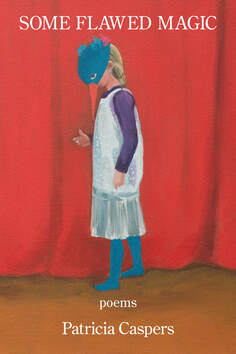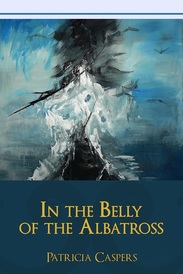Praise for The Most Kissed Woman in the World:
Patricia Caspers brought me to my poetic knees with each portrait of God in her latest collection, The Most Kissed Woman in the World. Here, God is a twelve-year-old girl, is the Sierra Nevada Watershed, is a dysfunctional family, is a girl gingko, who tells us, “Before words, there was a cool river. . .” The poems—all portraits—luxuriate in their language. God is a “dandelion woman” who doesn’t care if her pink bathrobe has loose buttons or God is deer on top of a compost pile, whose antlers are “dusty cattails.” The poems are deeply grounded in a world recognizable by its traumas and its emotional stakes, where there are “holes in the wall the size of God’s fist.” This collection creates sanctity and sanctuary, finding God in “The Space in My Mouth Where My Front Teeth Once Lived,” where one looks “to find out what I believe.” Caspers’ masterful poetry, her use of forms from sonnet to golden shovel, her insistence on wonder and faith, present the question, “what do four chambers have to do with all the vows we made?” This book, with all of its “beautiful cacophonies,” was a joyful experience, where as I read, I felt as if I had, “Come home.”
Jennifer Martelli, author of The Queen of Queens
Jennifer Martelli, author of The Queen of Queens
There is so much beauty in Patricia Caspers’ The Most Kissed Woman in the World, and a lot of darkness, too. In each “Portrait of God,” Caspers finds the sacred somewhere unexpected: a pungent ginkgo tree; an assisted living facility; a dysfunctional family; the self in all its gorgeous imperfections. These lyrical, surprising poems look at the world with hard-won clarity and tenderness, embracing joy without turning away from suffering. “God is the kitchen knife that misses,” Caspers writes, as well as “the crash of abundance.” Exactly. The Most Kissed Woman is sharp and generous and wise, reminding us where we hurt and also, in its revelatory unfoldings, why we go on.
Chloe Martinez, author of Ten Thousand Selves
Chloe Martinez, author of Ten Thousand Selves
Order The Most Kissed Woman in the World here (available now!)
Praise for Some Flawed Magic:
|
In her poem, “The Sewing Machine,” Patricia Caspers writes, “I have to reach in/with both hands to pull out the weight of the thing.” In her latest collection, Some Flawed Magic, Caspers examines the weightiest of all things: family, death, forgiveness. As I was reading this masterful book, I thought of a line from Rilke’s poem “The Neighbor,” which ends with, “Life is infinitely heavier/than the heaviness of all things.” Caspers’ poems are dense with details of things—both physical and emotional—laid out with poetic and mathematical precision.
--Jennifer Martelli, Harbor Review In this beautiful new book, Some Flawed Magic, poet Patricia Caspers draws detailed portraits of relationships that span both time and place. Each poem brims with sensory detail, including a dying cow who “knelt prayer-like on front legs;” and a family sewing machine that “hides in its scratched cabinet like an ivory treasure.” Against a backdrop of pastures, trees, rain-gullied snails, distant pick ups, and the mildew scent of geraniums, Caspers crafts a world where, “All of my childhood/ was this: gorging on neglect, praying/ for my eyes to glow golden.” By the end of the collection, the poet has studiously examined not only her own life, but the lives of her children. The book closes with infinite wisdom: “This is not grief,/ but its sister perhaps,/ the goodbye of growing up.” Some Flawed Magic paints three generations of care, kindness, and intimacy with craftful strokes and colors.
~Patricia Colleen Murphy, Author of Bully Love |
Patricia Caspers' second collection seeks to reconcile grief with growing up. Some Flawed Magic is an equation, and Caspers solves for all the “theorems scratched…in childhood notebooks” as she maps familial stories both past and present. Caspers asks the tough questions that make us redefine who we are in relation to the people who made us and the people who we shape in turn. Poets are the orators of truth and time, and Caspers asks “Isn’t the past always for sale?” Some Flawed Magic is a record of ancestry that examines how “to break a family / to hold it together.” These fervent narratives ground readers in a rich description of place where “pine-lined roads” reveal and “divulge secrets / from [their] depths.” Some Flawed Magic is a wondrous coupling of memory with reality. Readers will be left tender and moved.
~John McCarthy, Author of Scared Violent Like Horses
~John McCarthy, Author of Scared Violent Like Horses
In the Belly of the Albatross, Glass Lyre Press
|
“In these moving poems, many of them dramatic monologues spoken by women, Patricia Caspers conjures up the lives of historical individuals — a black slave midwife who [gives] ‘Justice her dowry,’ Amelia Earhart’s mother, waiting hopefully for her daughter’s return. And she reimagines the figures of Greek and Hebrew legend– the Gorgon who begs for ‘the gift of monstrosity’ the biblical Ruth, revealing a sensuality the Bible does not allow her … Caspers’ poems flourish and grow by turning themselves undaunted to the light.”
— Chana Bloch In the Belly of the Albatross is available from Glass Lyre Press. |


